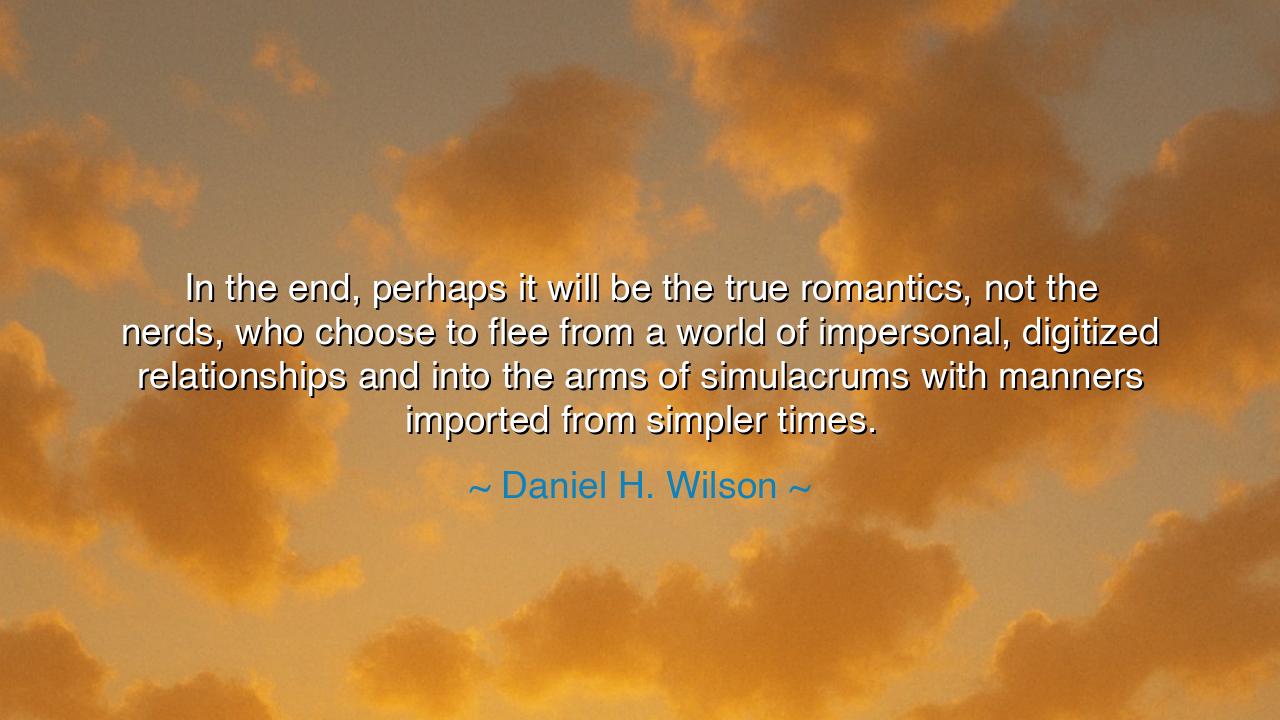
In the end, perhaps it will be the true romantics, not the nerds
In the end, perhaps it will be the true romantics, not the nerds, who choose to flee from a world of impersonal, digitized relationships and into the arms of simulacrums with manners imported from simpler times.






In the words of Daniel H. Wilson, “In the end, perhaps it will be the true romantics, not the nerds, who choose to flee from a world of impersonal, digitized relationships and into the arms of simulacrums with manners imported from simpler times.” Though spoken with the wit of one who contemplates the future, these words carry the resonance of prophecy. They warn us of an age where the warm pulse of human connection may be replaced by the cold embrace of machines, where men and women may turn not to each other, but to crafted illusions of affection. Within this lies both irony and sorrow—that those who love most deeply, the romantics, might one day surrender their longing to shadows.
The ancients would have called such simulacrums idols, false gods fashioned by human hands to satisfy the cravings of the heart. Just as tribes once carved figures of stone and wood to embody their hopes, so too does the modern world create machines to mimic love, companionship, and courtesy. But Daniel H. Wilson speaks a greater paradox: it will not be the calculating minds—the so-called nerds—who are most seduced by these illusions, but the romantics, whose yearning for tenderness makes them vulnerable to counterfeit affection. For when true intimacy becomes rare in a world of hurried texts and shallow connections, even an artificial gesture may seem like paradise.
History bears witness to this cycle. In the days of ancient Rome, when the empire grew decadent, many fled not to the vigor of real love but to staged pleasures. Gladiatorial games and feasts of excess became substitutes for authentic bonds of community and spirit. The people hungered for meaning, yet fed themselves with shadows. In the same way, Wilson warns us: if we let digitized relationships replace human presence, we risk building an empire of illusion, rich in spectacle but poor in truth.
And yet, there is also tenderness in his vision. For the romantics do not flee because they are weak; they flee because they desire love in its gentlest and most human form. They dream of “manners imported from simpler times,” when affection was slower, deeper, clothed in ritual and reverence. They seek not noise but sincerity, not instant gratification but enduring devotion. But if they cannot find it among living souls, they may accept it from crafted figures, believing the illusion preferable to the coldness of the modern age. This is both a warning and a plea.
What is the lesson here? That we must not allow love to become a shadow of itself. We must guard the sanctity of relationships, keeping them personal, tender, and alive with presence. Technology may aid communication, but it must never replace the living voice, the touch of a hand, the shared silence of two souls who need no words. For if we neglect this, we may awaken one day to find that we, too, have chosen shadows over reality, and that our most romantic hearts have been deceived.
Therefore, O listener, take heed: seek real connection while it may still be found. Do not give your heart to illusions, nor trade the fire of true affection for the flicker of false light. Share meals, walk together, look into the eyes of those you love, and speak with honesty. Cherish the imperfections of human beings, for it is in their flaws that love becomes real. Resist the temptation to withdraw into simulacrums; instead, labor to keep alive the art of true companionship, for it is a treasure greater than any invention of man.
And what should you do? Begin today. Reach out with sincerity to one you love, not through a screen, but in presence. Create spaces free of distraction, where hearts can meet without digital noise. Honor the rituals of affection that were passed down by generations before you: the letter written by hand, the touch offered in silence, the courtesy of patience. In this way, you prove Wilson’s prophecy false, and show that the romantics of this age will not flee into illusions, but will remain guardians of real love in a world that too easily forgets it.






AAdministratorAdministrator
Welcome, honored guests. Please leave a comment, we will respond soon